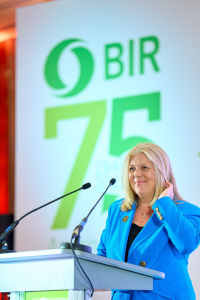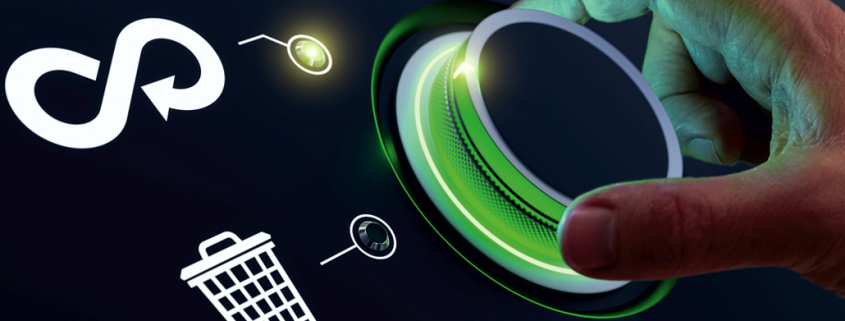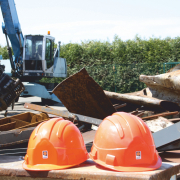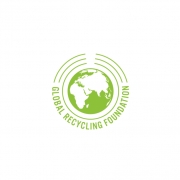Interview with BIR President Susie Burrage: “The Market for Recycled Materials has Experienced Significant Development and Growth”
At the latest convention of the Bureau of International Recycling (BIR) in Amsterdam, Susie Burrage was elected as the 23rd President of the global federation. She succeeds Tom Bird, who had completed his four-year term in office.
Susie Burrage has committed herself to recycling for many years. She is the fourth generation of her family in recycling and worked alongside her father before founding her own company, Recycled Products Ltd, in 2001. Since 2016, she is also President of the British Metals Recycling Association (BMRA). Furthermore, Susie Burrage serves as President of the European Metal Trade and Recycling Branch of EuRIC (European Recycling Industries’ Confederation), UK Ambassador for the BIR, Ambassador for the Global Recycling Foundation, and Patron of the Bureau of Middle East Recycling. All roles are undertaken voluntarily.
On June 29 this year, she attended her official investiture at Windsor Castle as Officer of the British Empire (OBE); she was appointed in the King’s inaugural New Year Honours in 2023 in recognition of her services to the recycling and environment sector.
As BIR’s new president, the recycling expert has ambitious plans. In GLOBAL RECYCLING, she explained her key aims.
In your speech as elected BIR President, you mentioned several goals. Which one takes priority over the others?
Indeed, during my acceptance speech, I mentioned a number of goals that I have set for my presidency: utilizing the enthusiasm of young people via our Young Traders Group, encouraging the participation of women in BIR committees, growing membership in numbers and geographical outreach, enhancing member benefits, continuing to generate factual information and data to support advocacy and communication efforts, and strengthening certain Divisions and Committees within BIR, specifically those related to paper, textiles, and plastics.
They are all important, but my main focus since my election as BIR President has been to work closely with the BIR Director General Arnaud Brunet and his team to define some immediate action points: with Communications Director Elisabeth Christ we are working on expanding our communications outputs, in particular regarding the extensive scope of our advocacy work led by our newly appointed Trade and Environment Director, Alev Somer. Another immediate priority is of course our upcoming World Recycling Conference in Abu Dhabi on October (22) 23-24.
For a long time, the role of recycling in the circular economy, CO2 savings and material supply have been well-known and proven by studies. Nevertheless, it seems that not everyone is fully convinced of the benefits. Therefore, recycling does not have the status it deserves. In your opinion, how could this be changed?
There are several ways in which we can increase recognition and improve the perception of the recycling industry. Firstly, by continuing to work closely with Governments around the world through our World Council of National Associations. We must highlight successful recycling initiatives and projects through various media outlets. By sharing positive stories, we can inspire others and shine a light on the achievements and importance of the recycling industry. We can launch comprehensive campaigns to educate the general public about the importance and benefits of recycling. BIR has recently engaged the services of Unity, a high-profile PR company to assist with this. We can develop partnerships with schools and educational institutions and encourage them to integrate recycling education into their curriculums. By targeting the younger generation, we can instill a long-lasting appreciation for recycling and its industry.
Does this situation also have something to do with the market’s activities in more challenging economic times?
In terms of international trade, the horizon is cloudier with the threat of recession hovering in Western countries and the energy crisis leading to higher logistical costs, combined with increasing trade barriers, including sanctions and protectionist policies.
What is your view on the development of the market for different types of recycled materials?
The market for recycled materials has experienced significant development and growth in recent years. Paper recycling is one of the longest-standing. The recycled paper and cardboard market has steadily grown due to increased demand from industries such as packaging, printing, and tissue manufacturing. The development of advanced paper recycling technologies has contributed to better quality recycled paper, making it more desirable for various applications.

Susie Burrage: “BIR’s mission has always been to promote free and fair trade of recyclables in a sustainable and competitive world economy, to encourage the environmentally sound management of resources, and the use of recycled materials
worldwide.” (Photo: BIR)
The market for recycled plastics has seen significant progress, albeit with some challenges. With increased awareness of plastic pollution, there is a growing demand for recycled plastics in industries such as packaging, automotive, construction, and consumer goods. Technological advancements have improved the sorting and processing of different plastic types, allowing for higher-quality recycled materials. However, issues like limited infrastructure and lack of standardized plastic recycling systems have led to variations in market development across regions.
The market for recycled metals, such as aluminum, steel, and copper, is well established and has developed well due to factors like high scrap metal prices, energy savings in production, and environmental benefits. Recycling rates for metals are generally high, thanks to the well-established infrastructure for collection and processing. The automotive, construction, and manufacturing industries are major consumers of recycled metals, driving the demand for these materials.
The market for recycled electronics and e-waste has gained attention due to the increasing volume of electronic waste globally. Recovery of valuable metals like gold, silver, and copper from electronic waste is economically beneficial and environmentally responsible. The development of specialized e-waste recycling facilities and the implementation of regulations for proper disposal and recycling have helped drive the growth of this market.
The market for recycling textiles has experienced significant growth in recent years due to increased awareness about sustainability, environmental concerns and the circular economy. Despite the progress made in the textiles recycling market, challenges still exist, such as limited infrastructure, lack of consumer awareness, and the need for further technological advancements.
Overall, the market for different types of recycled materials has developed and diversified in response to the growing recognition of the environmental and economic benefits of recycling. The expansion of recycling infrastructure, advancements in recycling technologies and increased demand from various industries have all contributed to the positive development of these markets. However, continued efforts are needed to address challenges such as improving recycling rates, establishing consistent quality standards, and fostering sustainable market development practices.
To what extent do import and export restrictions affect companies in the recycling industry and the use of secondary raw materials?
BIR’s mission has always been to promote free and fair trade of recyclables in a sustainable and competitive world economy, to encourage the environmentally sound management of resources, and the use of recycled materials worldwide. Its mission has become ever more important in the current geopolitical context with increasing pressure on international trade, and access to primary and secondary resources, together with net-zero ambitions and surging energy prices. The green and digital transition has increased the demand for critical and strategic raw materials to produce renewable energy and the technologies we use in our modern lives, as well as in defense and aerospace. This significant demand for critical raw materials has led to a growing number of government initiatives across the world to secure the supply of those materials with new bilateral trade agreements and more protectionist policies at national level.
BIR, as a world recycling association, is growing quite rapidly and now has almost 1,000 members from 70 countries worldwide. Which actions are planned to increase the number of members and to enlarge the “geographical footprint”?
One of the best ways to attract attention to our organization is to utilize various communications channels such as social media, email, newsletters and industry publications and reach out to existing and potential members. Of course, we must and will continue to hold our premier world recycling conferences. These gatherings serve as platforms to attract new members by showcasing BIR’s influence, expertise and networking opportunities.
You also signaled your intention to strengthen some of BIR’s Divisions and Committees, particularly those covering paper, textiles and plastics. Are these the sectors that will become increasingly important for the industry in the foreseeable future?
As we navigate the challenges of environmental sustainability, it is crucial to recognize the importance of all streams of recycling. Historically, BIR’s four commodity divisions were equally strong, but for some time now, BIR has tended to be seen as predominately metal-centric so I wish to increase the voice of the other streams we represent. All streams reduce waste, save energy, reduce emissions, create jobs, enable economic growth and are essential ingredients in the circular economy.
What benefits does BIR offer to its members?
A trading platform, a networking opportunity, advocacy, experience, knowledge – where else in the recycling world are you guaranteed the opportunity to rub shoulders with recycling industry greats and benefit from their words of wisdom.
Among your goals for the next few years is to encourage young people to get involved in the industry “by increasing the presence of young traders and their involvement in BIR structures and governance”. How do you plan to achieve this?
Role models play a crucial role in shaping individuals’ beliefs, attitudes and behaviors. They serve as sources of inspiration, guidance, and motivation for people, especially in their formative years. A role model is always inspirational, especially when it is someone you can identify with. By increasing the number of young traders in BIR structures and governance I hope to encourage many more to get involved once they see the opportunities and benefits of being involved. Unfortunately, there weren’t any women for me to follow in the footsteps of, but some of the most precious and significant moments of my career are when a young female takes the time to tell me that I have inspired them.
How could the next generation – women and men – contribute to BIR’s further development?
Despite the tsunami of legislative changes and challenges we are facing, I believe the recycling industry, despite having been in successful existence for many decades, is now coming of age in the eyes of the general public. I am a strong believer in collaboration and the more of us there are, the louder and stronger our voice will be.
By involving the young people already within BIR in decision-making, I hope to give them a sense of empowerment, autonomy, responsibility and ownership of BIR, their international recycling organization going forward.
Ms. Burrage, thank you very much for the interview!
(Published in GLOBAL RECYCLING Magazine 3/2023, Page 28, Photo: NicoElNino / stock.adobe.com)







